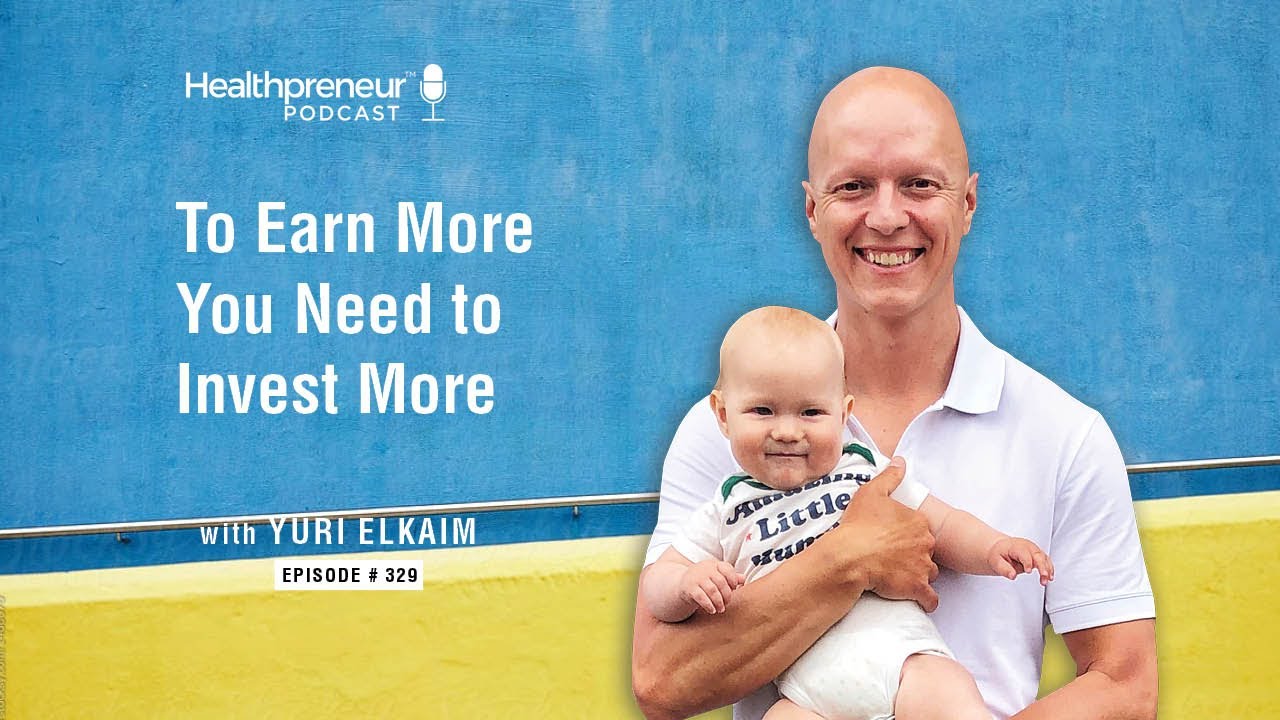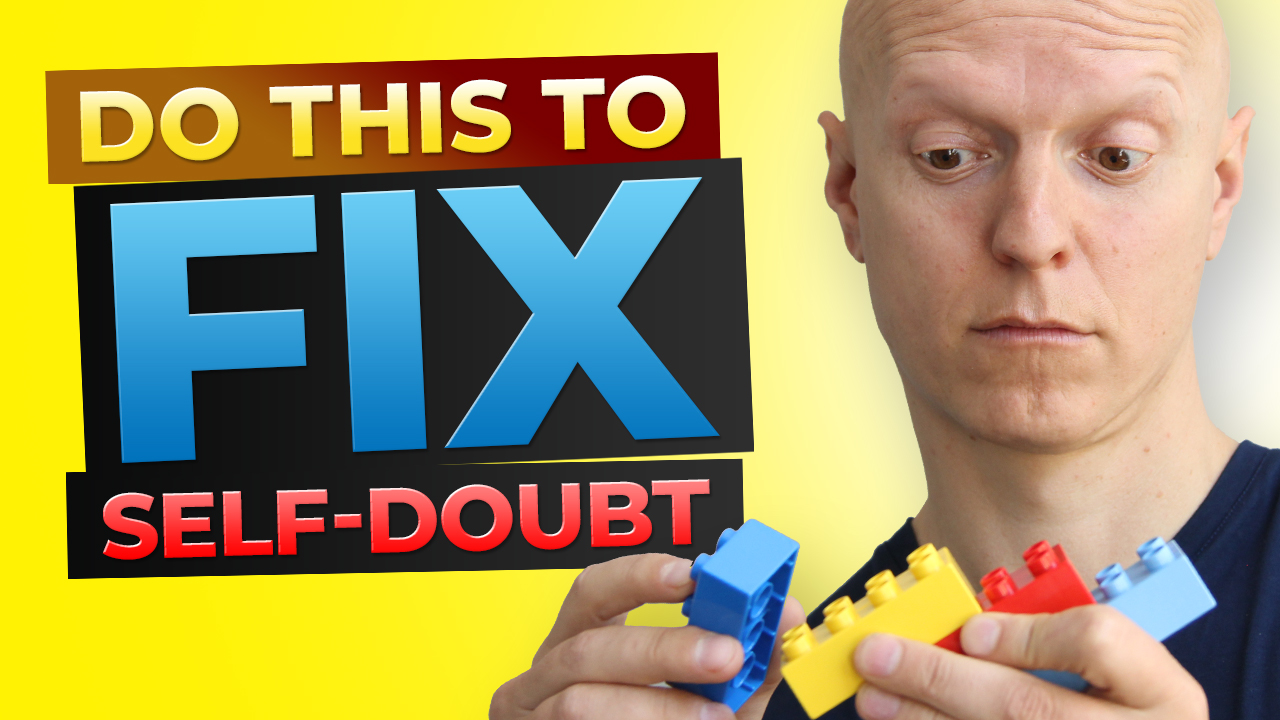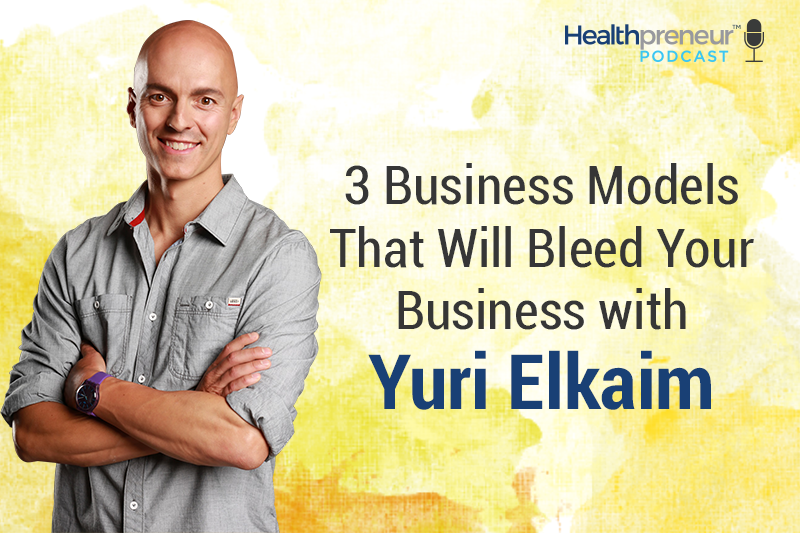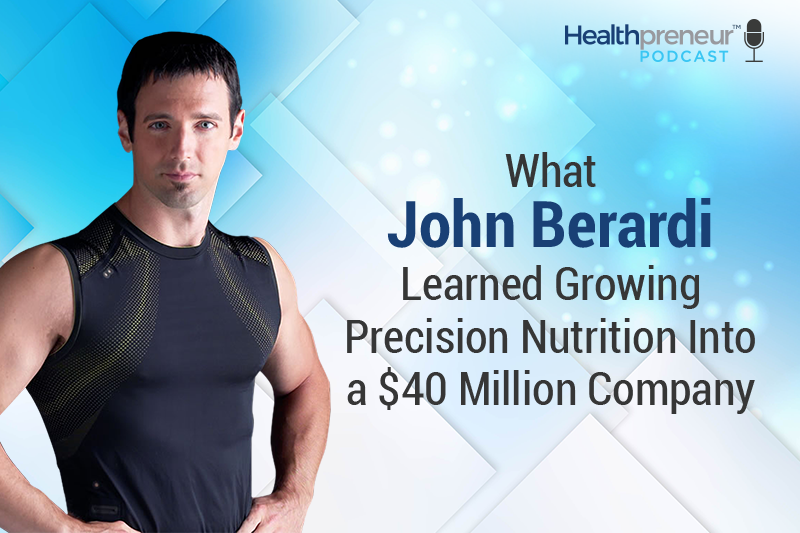The First Idea Fallacy

It’s another beautiful day on the Healthpreneur podcast! Yuri here, and today I’m going to talk about the first idea fallacy. What is that, you ask? Well, sometimes, when you first start a business, your first idea isn’t your best.
We have a lot of clients that are ramping up their new businesses. When they realize that things aren’t exactly going as they’d hoped, they must recalibrate so their offer is a “must have” instead of a “nice-to-have”.
Know that there’s an ongoing process of learning, tweaking, and optimizing in business. And that’s ok. As things change and technology advances, that’s especially true in marketing. So, tune in to understand the first idea fallacy and evolve your business to the next level with clarity, momentum, and purpose.
In This Episode I discuss:
01:00 – 03:00 – Introducing today’s topic: The first idea fallacy
03:00 – 05:30 – The idea generation process
05:30 – 09:00 – Imparting wisdom while still encouraging struggle
09:00 – 12:00 – Seeing Facebook as the bouncer at the door
12:00 – 17:00 – Letting go of that first idea and thinking like a detective
Transcription
Hey, hey, welcome back to the show, Yuri with you and excited to bring today’s episode to you, which is brought to you by no sponsors because we don’t do that on this show, as you know.
Introducing today’s topic: The first idea fallacy
Anyways, today’s episode, we’re talking about the first idea fallacy. And what this essentially means is, well, let me give you some context. The reason I want to discuss this today is because a lot of times, especially when you’re newer in business, when you’re starting your business, you’re getting your business kind of in that foundation zone and building it from there a lot of times what you think is a great idea really sucks. Okay. And that’s okay. So I call this the first idea fallacy. And the whole premise is that your first idea is most likely not your best one.
And I share this with you because we have a lot of clients who are kind of ramping up and started their businesses and kind of building that foundation, which is so important. And a lot of times they’ll launch their pipeline or they’ll get their webinar or live or they have their initial program and it doesn’t work out as well as they hoped it would. So there’re a couple elements to why that might happen. So there’s obviously, the messaging, which could be off, or ultimately what it comes down to is you’re offering something that people don’t even care about. And this is something I think is really important to remember, especially when you’re charging high ticket prices for your coaching, is you have to be offering something that people really, really want so it’s not like a nice to have. We spent a lot of time with our clients who really working around this.
The idea generation process
For instance, does somebody want to get fit? Sure. But they’ll pick up a men’s health magazine to do that. Right. And then not all the time. Right. But let’s just look at this comparison. “My name is Yuri, I’m going to help you get fit, It’s an eight-week program. It’s $5,000.” “Cool. Awesome. Let me think about that, okay? Compare that to, “Hi, my name’s Yuri, over the next eight weeks I’m going to help you put on 10 pounds of muscle and I’m going to help you look amazing when you look in the mirror. How about that?” Okay, that’s a little more tangible. It’s a little more juicy. I can sink my teeth into that. So part of this idea generation process is coming up with something that people really, really want.
Now, how do you know what people want? Well, if you’re good at what you do, you should know that already, right? You should have been working with clients. You’ll know what they want. You just get a sense, right? You just look at what the marketplace is talking about. What people are suffering with. What they’re having issues with, and you create your offers around that, assuming that is something you can actually deliver on. So the key is that you want to make your offer, like your program, for instance, something really, really valuable, which means that it solves a major pain or problem for someone, or it’s something that is strongly desired. And if it’s not there, if it’s kind of a nice to have, not a must to have, you’re going to have a tough time making that work. So we’ll bring it back to this idea, it’s the first idea, is the first idea might look like I help people lose weight. I help people get in shape. I help men get fit. And that’s a good first idea. That’s a good starting point.
Imparting wisdom while still encouraging struggle
And sometimes it’s actually good to launch that and struggle. And obviously, my intention as a coach is never to have any of my clients or anyone suffer because that’s my goal is to end suffering for all of them. Right? That’s what I want to do. But you have to go through the journey. So my son, as an example, was trying to open a bottle of water the other day. So we’ve got a bottle of water and he couldn’t open it. And he’s like, “Can you open this for me?” I’m like, “I could, but I’d rather you struggle with this for a little bit,” right? Figure out a way to make this happen. And so he was doing it with his bare hands and then I’m like, “Well what if you put your gloves on, so it didn’t hurt your skin as much?” And then he did that and he was able to twist off the cap. I was like, “Cool, you did it right? That’s awesome.”
So there’s a balance in life and in business between doing everything yourself, which I don’t think is a good idea, but obviously going through the journey where you have to go through those points of struggle where you come up with the insights to understand that you know what? Maybe that wasn’t a good idea. Right? I tested this out. I had these discussions, obviously, I threw it against the wall and it didn’t stick. Now, I know, and remember, words don’t teach. Life experience does. And that’s the challenge with coaching sometimes is that if you’re coaching clients is you want to be able to impart your wisdom on them, but at the same time they have to, and you have to encourage them, to have a little bit of struggle, right?
A little bit of struggle so that they internalize the breakthrough for themselves. And I think if you’ve got kids, I firmly believe that I think there’s a certain amount of struggle they should go through. I never want to spoon feed my kids. I don’t buy anything for them. I mean if they want to buy Pokemon Cards, they have money. I say, “Hey guys, listen if you want to go buy Pokemon Cards, you’re using your money to buy the Pokemon Cards.” One of our youngest kids, Arlo, had a bit of a temper tantrum and smashed our front door. The handle went through the drywall. He put a hole in the wall and I was like, “Oh, my God, they are toast dude.”
But essentially what I told them is, “You’re paying for that,” and he’s five years old. And you may or may not agree with me. I don’t care. This is just the way I look at this is kids don’t value much because they don’t pay for it. They don’t value their toys, they don’t value the house they live in, they don’t value the food you make for them because there’s no struggle. There’s no value creation on their part to make that a reality. So I told Arlo like “Hey, buddy, listen, I don’t know how much this is going to cost, but it’s going to come out of your money for as long as needed until it’s paid off. So I don’t care if it’s a $500 repair, that birthday money you got, it’s coming right into that repair.” And yes, you might think, “Yuri, you are a frigging tyrant as a parent,” I don’t really care. But I want my kids to learn the lesson that you have to take responsibility for the outcomes in your life.
So I’m like, “Listen if you want to break the wall, that’s fine. That’s your choice. But you’re going to pay for it. If you want to buy more Pokemon cards. Hey, that’s, that’s great. You have a certain amount of money you get for your birthdays and other things. Half of that money is put aside in savings. The other half you can do whatever with. So if you want to buy Pokemon cards, you’re making the choice to use your money to buy that, but when you don’t have that money anymore, remember that was your choice.” So where am I going with this? I don’t even, I don’t even know how I got off on this tangent, but I think it comes back down to you value what you go through, and so I believe, personally for me, I believe it’s important to go through a little bit of the challenge to test something out, to see that it doesn’t work. Cool. I got that, checked that off. Let’s move on to the next idea.
Seeing Facebook as the bouncer at the door
I think a great example of this is Facebook advertising. I love Facebook Ads. You should as well. Facebook is your YouTube channel. It’s your blog. It’s your email list. Every single person you ever want to help is on Facebook. And if you look at it that way and look at, “How do I get more of those people on Facebook into my world?” Think of it like this. Think of it, well, just on the side, you can’t obviously can’t see this but right over there is the door to the studios, is the door to my room here. Now, consider this, on the other side of that door is every single client I could ever ask for. Every single client you could ever ask for.
Now, Facebook is the gatekeeper. Facebook is the door it’s kind of like the bouncers like, “Hey, man, I’m going to slip you a 20 can I get in?” And he’s like, “Yeah, no problem. Let’s get in.” So you slip him the 20, you get into the club for instance. But let’s say you’ve got a bunch of friends with you. Now, you’re going to slip them the 20, 40, 50, 100, 200 bucks. Now, a bunch of your peeps are going to come into the club with you. And this is kind of like Facebook. It’s the more money you give Facebook, the more they’re going to open the door to allow more of your clients or perfect people to see your stuff and engage with you. And I think it’s a great opportunity no matter … And you don’t need to have a marketing budget for this because if you do have a pipeline or a funnel built out that’s the acquisition of those clients is going to pay for your ad spend, then you don’t need to worry about having a budget for instance. Right?
Letting go of that first idea and thinking like a detective
But think about this, do you know that the first ad is going to work? The message or the image, is that going to work right off the bat? I don’t know. Maybe and maybe not. So what do you want to consider is you need to look at this as you are you’re an investor and you’re also a detective. So the investor mindset is thinking about, “Okay, I’m going to put in 100 bucks and let’s see what happens. If I can make 200, 500, 1,000 return, that’s great.”
The detective is thinking about, “Okay, I’m going to test this one idea, this one message, this one image, this one headline, this one angle. We’re going to put it up there. If it resonates, cool. If it doesn’t, let’s think of something else,” is you’re always testing new ideas, new angles, new images. And there’s no one perfect ad because everyone’s business is different and your story, your message is going to be unique based on your situation.
So in terms of having this resilience to go through and understand that if you put up 10 ads, eight of them are probably going to suck, but two of them are really going to be good and it’s probably not the two that you think are going to be the best. And this is the big insight that I’ve had over the years in business is that the idea you think is going to be the big one. A lot of times it’s not, and I’ve shared this story with you before, but my third in the pros launch back in the day, we thought it was going to do seven figures and it ended up doing $5,000 there’s a lot of learning in that. I think one of the reasons that we really encourage our clients to at least initially understand Facebook advertising at a very basic level is that they start to look at business through this lens is, “Okay, well this didn’t work. This one did. Okay, cool. Let me try something else and this one’s working well, let’s keep that going. Let’s put something else into the mixer, see how that’s going.”
Now, you start to think through a different lens as you grow your business to understand that it’s not just one thing that your whole life depends on. It’s constantly testing new ideas because the only feedback that matters is from the marketplace. And yes, coaches can give you feedback and direction, but ultimately say, “Hey, does this headline make sense?” “Sure. I think it looks good,” or “No, it sucks. Try this.” But I don’t know what it’s going to convert at. You have to put it out there and see what the market tells you because that’s all that is going to give you the concrete data in the long run. So don’t get too hung up on if you’ve had something you thought was going to be great, it didn’t work.
Okay, well maybe you tweak the idea, you tweak the offer a little bit to make it more compelling. You change the messaging around it or you scrap it altogether and you’re like, “You know what? It wasn’t a waste of time. It was a learning,” and you move on to something else. But again, there’s this fine line between not always jumping ship to the next thing, but really starting to understand. Thinking like a detective like, “Why didn’t this work? Where’s the leak in this process? What could be tighter? What could be better?” And this is why business is challenging. There’s no easy way to go from zero to hero in a very short amount of time. Yes, you can do it quickly, but you have to understand that there’s a process. There’s a process of learning, tweaking, optimizing, testing something new that didn’t work, test something new.
That’s the ongoing process we all have to go through to build a successful business, especially, when we’re marketing, right? Because that’s pretty much what we’re doing is we’re putting our stuff out there and we’re seeing what resonates with people. So that is the whole concept I want to share with you today. The first idea of fallacies from my take home is don’t get upset if you’re first thing doesn’t work out. Just keep at it. Again, remember, a big shot is simply a little shot who just kept on shooting. That’s it, right? There’s no, there’s no genetic mutation that makes you a successful business entrepreneur, right? Or a coach or whatever you want to call yourself. So that’s the goal. Again, if you want to help move your business forward, we have our Luminaries Mastermind coming up in Toronto, June 26th and 27th if you’re interested in joining us.
Couple things. Number one it’s two days. I’m going to be walking you through my Million Dollar Model, which is exactly how we help our clients go from where they are to adding a minimum of 10K per month in revenue to their business. The details are over at, you probably want to write this down, Healthpreneurgroup.com/2, as in the number two. Not spelled out, but the actual, just press the number 2 on your keyboard. 2day, D-A-Y, so 2day and you’ll get all the information for the event. Now, here’s the thing is we have early bird pricing, which expires on the 31st of March. That gives you about a week. It’s going for $300 so if you want to join us, we’re making it super affordable to join us, so basically, you’re just going to pay for the meals and all the materials. We’re basically just it to you at cost. Okay?
Two criteria you have to be very, very aware of. Number one, you have to have an existing coaching business. If you’re working in a full-time job and you’re thinking about starting a coaching business, this is not for you, okay. Second, so you have to have experience coaching clients. Second, you have to be generating revenue. If you are pre-revenue and you’ve got zero clients, this is not a fit for you, but if you are generating revenue and you are working with clients and you have a history obviously of coaching, then this can be a really good fit.
So what you’re going to want to do is go to healthpreneur group.com/2day. Fill out the application. We’ll have a look at the application. I will personally get back to you within 24 hours with a yes or no and you’ll be in a room with about 20 to 25 other people on the first day.
On the second day, we’re bringing our clients in and so you’ll be mixed in with them and we’ll be talking about some next level high-level strategies. It’s going to be a great experience. Plus, you’ll get to hang out with me and you’ll have my hands-on help for two days, which is going to be a game changer for your business. So that’s the deal for today. Hope this episode has found you well, if I can continue speaking I will see if I can stop fumbling my words here and as I’m going to shut it down for today, hope you have an awesome one, healthpreneurgroup.com/2day. Apply to join us in Toronto if you fit the criteria and I look forward to seeing you in our next episode.
If you enjoyed this episode, head on over to iTunes and subscribe to Healthpreneur™ Podcast if you haven’t done so already.
While you’re there, leave a rating and review. It really helps us out to reach more people because that is what we’re here to do.
What You Missed
In our last episode, I talked about innovation versus imitation. Why is this important? Because if you aren’t a thought-leader, you’re a thought-repeater. Which do you prefer?
Go on social media and you’ll see that there are thousands of people doing exactly what you do. And if you want to be heard above the noise, you’ve GOT to stand out. You’ve got to start making moves NOW that’ll keep you at the forefront of the industry for years to come.
In this episode, I’ve got a couple simple pointers to get you started on the path to thought leadership. Whatever your business, chances are you can apply these ideas to stand out and innovate something new.
Related posts
February 28, 2018
What John Berardi Learned Growing Precision Nutrition Into a $40 Million Company
Today we have the man, the myth,…





